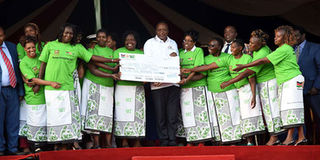Let us build a more inclusive nation

President Uhuru Kenyatta hands Kiambu Women Enterprise Fund members a dummy cheque of Ksh83.2 million during a function at Ndumberi stadium in Kiambu County on December 5, 2018. The fund has transformed thousands of women into innovative entrepreneurs. PHOTO | FILE | NATION MEDIA GROUP
What you need to know:
- The African Development Bank (AfDB) Gender Equality Index notes that women make a sizeable contribution to the continent’s economy.
- The country’s progress has been impressive in linking women to sustainable development through the establishment of affirmative funds.
The world is largely patriarchal. Even in progressive modern countries like the United States, women have needed propping to access some basic human rights.
In America, which became independent in 1776, it took the 19th Amendment of the Constitution, 144 years later, for women to be allowed to vote in August 1920.
In patriarchal societies like ours, it is easy to think women are active participants in the social, cultural and economic activities, yet they are mere observers.
The African Development Bank (AfDB) Gender Equality Index notes that women make a sizeable contribution to the continent’s economy.
PRODUCTIVITY
They are more economically active as farmers and entrepreneurs than those in the rest of the world. They grow most of the food and own a third of all businesses.
However, they spend way too much time in unproductive pursuits such as fetching water and firewood. They work 50 percent more hours than men. They hold the short end of the economic stick.
Gender equality and women empowerment programmes therefore are a prerequisite for the emancipation of the African woman.
Every March, UN Women convenes the two-week Convention on the Status of Women (CSW) at the United Nations headquarters, New York.
Kenya is participating in the 63rd session of this platform to review member states’ progress in advancement of women’s rights.
REVIEW
The issues considered a hindrance to women’s rights are addressed under a priority theme encapsulating empowerment and gender equality concerns, which breaks the ground and sets normative standards for the treatment of women.
This year’s theme is “Social protection systems, access to public services and sustainable infrastructure for gender equality and the empowerment of women and girls”.
Every CSW reviews progress on the resolutions of the previous session pertinent to the current theme.
This year, member states are reviewing progress on conclusions made three years ago under a theme that primarily addressed women empowerment and the link to sustainable development.
Given the interlinked themes, Kenya has an impressive report and lessons to share with the rest of the members.
ENTREPRENEUR
In social justice and inclusion terms, the country’s progress has been impressive in linking women to sustainable development through the establishment of affirmative funds.
The women-targeted Uwezo Fund and Women Enterprise Fund have transformed thousands of women into innovative entrepreneurs with established sustainable sources of livelihood.
Uwezo Fund has disbursed Sh6 billion to a million beneficiaries through 65,000 women groups, and Women Enterprise Fund over Sh15 billion to 1.5 million women through 95,000 groups.
SOCIAL PROTECTION
On the subtheme of social protection mechanisms, Kenya had innovative programmes to share.
They include social protection programmes to shield the elderly and other vulnerable groups through the cash transfer programmes and hunger response interventions.
The former have reached 200,000 vulnerable old persons, a majority of them women, while the latter include Njaa Marufuku, a hunger safety net for the vulnerable. The school feeding programme cushions schoolchildren.
In addition, the health insurance subsidy has facilitated millions of citizens to access affordable healthcare. Linda Mama gives mother and child access to medical care.
The menstrual health management programme oversees distribution of sanitary towels to eligible girls in public schools, and CSW member countries have been keen to replicate the game changer in equality in girl-child education.
HUDUMA CENTRE
The award-winning Huduma “one-stop shop” takes public services to the people and has reached over 50,000 poor and marginalised citizens.
The model has created immense interest at the convention. Indeed, it has served as a benchmark for 18 country delegations from the region, who aim to replicate it.
Overall, the session provides an opportunity for the Kenyan delegation to showcase its achievements through side events and share lessons on design and implementation.
Kenya comes behind only Rwanda, Burundi, South Africa, Mozambique and Malawi in the AfDB index. We cannot afford to leave behind half of our human resource disengaged.
We need to re-examine our patriarchal biases and give women the space to fully participate in national development activities.
We must evolve into a more inclusive nation to claim leadership in all spheres of gender equality and women empowerment.
Prof Kobia is the Cabinet Secretary, Ministry of Public Service, Youth and Gender Affairs. [email protected]





